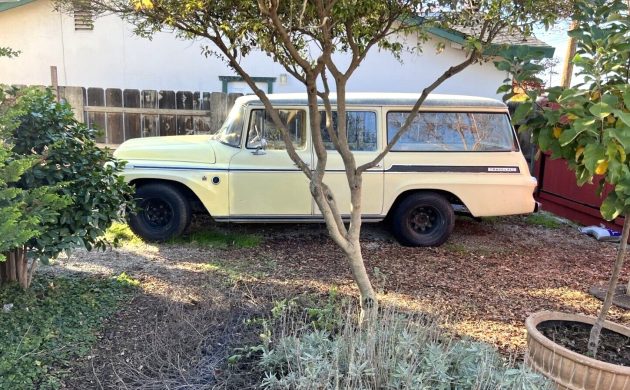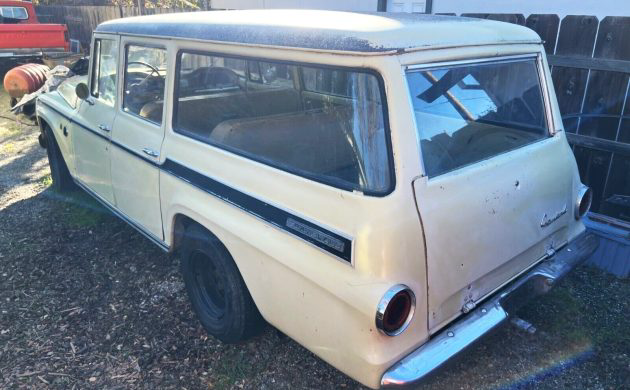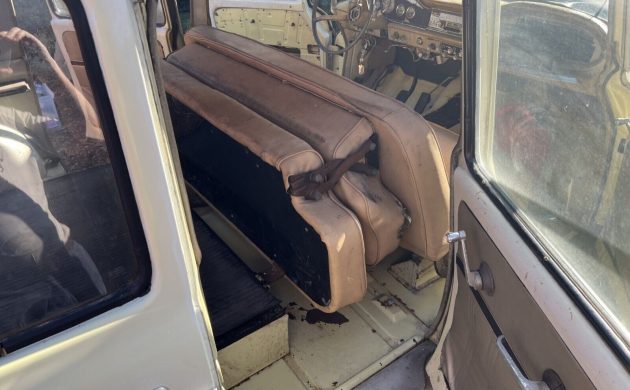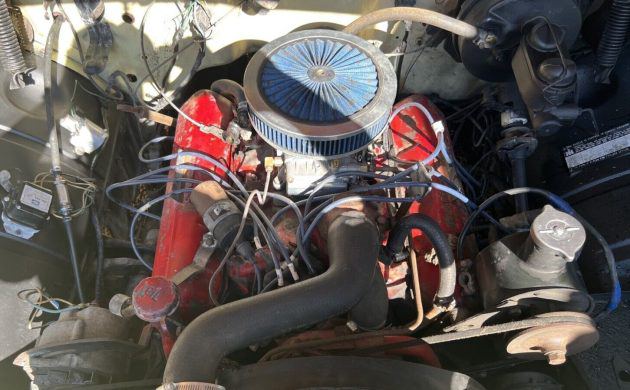Here’s something you don’t see every day – an International Harvester Travelall which was their version of the Chevrolet Suburban. IH built the SUV from 1953 to 1975 and – with the departure of the Scout from the market in 1980 – were the last light-duty “trucks” produced by the company. This ’68 edition of the Travelall 1000-C is a running survivor, but it needs both mechanical and cosmetic attention. You could fix it up and drive it for a while before tackling issues with the body. Located in Chico, California, this vintage Harvester people mover is available here on eBay where $6,500 is the current bid.
The Travelall was a large station wagon and would be considered an SUV today. It was truck-based, using the existing International ½ ton pickup platform, and was the first of its kind to come with four doors. The third generation arrived in 1961 and remained in production through 1968. The big news was the addition of an independent front suspension with torsion bars. Other than a longer wheelbase, the new Travelall resembled its predecessor. By the mid-1970s, Harvester had decided to begin exiting this segment of the market, choosing to focus on medium-duty and heavy-duty commercial trucks.
From the looks of things, this SUV is wearing all the sheet metal and paint it came with from the factory. Except for the black covering on the roof that has mostly dissipated. And some rust here and there including at least one hole in the cowl. But the floorboards appear to be solid. The seals around the glass are shot and – unless the vehicle is covered – water might get in during a rainstorm. The interior seems okay, and the dashboard has been stripped of his pad, awaiting a new one or a coat of paint instead.
This vehicle is powered by a 304 cubic inch V8 that runs, but only off a can of gas for now (the tank has been cleaned but not reconnected). The automatic transmission works fine, but the shifter is a little sloppy. Several new parts have been installed, including freeze plugs and a water pump pipe. The rear end, radiator, and carburetor have been rebuilt. The Travelall once had an auxiliary fuel tank but it’s missing now. The tires and wheel are mismatched in terms of size and should be sorted out. This is an unusual find in a world filled with SUVs, but this one is sold only with a bill of sale.








These trucks were thicker than flies on a dead horse back in the day out west. It seemed that every other farm family and one in ten families in town had one. They were tough and reliable, and there was room for all the kids when a trip to town was on. It’s a real tragedy that it all had to end in 1975; IH really shot itself in the foot back then. And they’re making a comeback. I might add that these look real good in 4×4 mode…
Awesome!
IH “shot itself in the foot”? I don’t understand. The reason that IH had to quit the light truck market by 1975 were the outrageous demands of the auto workers union. IH made them a reasonable offer, showed the union their open books, but the union refused to negotiate.
Actually, I think it was more that nobody has a crystal ball, especially in what’s to come next in transportation. IH concentrated all it’s efforts into the class 8 trucking market, that was going great guns at the time( mid 70s) The last D series pickups sorely needed an update, and the decision was made, rather than design a whole new pickup, that the competition already had, it was decided to drop the works. A fatal mistake, considering where light trucks went, and an unexpected competitor, Volvo, I believe is where IH “shot themselves in the foot”.
The union story was common, and sounds a lot like Chrysler and Kenosha.
Yes, the unions did a lot of damage to the automotive manufacturers but International’s problems went beyond that. Binder (like Studebaker) played the “nothing wrong” story through the 30s, claiming that things were OK and they paid out generous dividends to shareholders. What IH should’ve done was take a page out of its competitions’ books and reinvest its capital back into the company instead of dividends. Wartime production max’d out all manufacturing facilities and all anyone could do was keep their noses to the grindstone. The 50s came along and brought the postwar prosperity which would have its highs and lows right through to the 70s.
The early 70s ramped up everything to the max and everyone could sell everything it could build. Then the EPA and all of its gun-to-the-head policies. That’s when IH realized that it should’ve been upgrading its plants instead of patching the old pulley/jackshaft lines that were outdated in the 20s.
Interest rates started taking its toll and Binder had to make some hard choices. Trouble was, the choices should’ve been better. Part of the reason IH decided to abandon its light truck line was that it didn’t have the facilities to satisfy the overall demand. Big trucks were bringing in the money so IH slanted everything in that direction.
If Binder would’ve kept investing in itself, it could’ve withstood most of what knocked it down. But bad decisions hurt it badly. And that’s where I use the term: “Shot itself in the foot.” The union did a lot of damage. But by 1979, when Iacocca crashed the union meeting at Chrysler and read it the riot act, the unions lost most of the wind from their sails.
I got my information, either from what I gained by working for a dealership (as of late), and reading some very good books on International’s history. One good reference is International Trucks, by Patrick Foster.
The same thing happened at Studebaker. They had the highest labor costs in the industry, and a 1962 UAW strike helped hasten the closure of the South Bend plant.
And tough as nails
Wish I had time to read Geomechs stuff !
These aren’t quite enjoying the popularity of the Scout, so I’m thinking restomod. Find a totaled Escalade or Denali, pluck the drivetrain and other internals (making sure they’re in proper shape of course), and transplant them into this rig after the rust and other cosmetic issues are fixed.
This is some sort of twisted joke, right?
It’s not funny.
It’s okay, I see where they are going, except, best to just drop this body on a Denali/Suburban chassis, if you are going for that. I think it would be a form of blasphemy, as there was nothing wrong with the way it was.
but isnt that what the co. wuz doing anyway? I remember trips to prts store’n counter man saying “yeah, they get that from ford, yeah cheb, “ etc…
I’ll call this a ‘late model’ as I remember most as 2 & 3 dor…
8^ )
1957 IH came out with the first factory built crew cab and it had three doors, probably the Travelall followed that. Don’t remember when they switched to four doors.
It was a tough time for independents. Studebaker threw in the towel, looking at the 1966 NTMVS act, which would require redesign of their last car and compliant emissions. Kaiser Jeep was sold for other reasons, but surely that was one reason no investor group tried to take it independent. Even niche manufacturers like King Midget were closed.
IH had a bit more resources, but they were drifting, and facing labor troubles.
And little money for advertising; and, as well, the light-truck market was shifting. Ford and Chevrolet were modernizing their product to appeal to non-work buyers. Chrysler was having a harder time finding the money.
International, never having the resources for styling changes or flashy ads, was left with a 1957 cab, heavily modified. Only the new safety standards of 1970, which had visibility requirements for windshield wipers, forced the issue, to the last new truck, the Light Line. Which was hastily done, with poor ergonomics and corrosion problems.
It couldn’t have gone any other way. This rig, these trucks, were good work vehicles for contractors and businesses. They simply didn’t translate well into consumer products, in that era’s style-conscious market.
1957 IH came out with the first factory built crew cab and it had three doors, probably the Travelall followed that. Don’t remember when they switched to four doors. I have also read that part of IH’s problem was they were selling their light line trucks through their tractor dealers and most people did not want to shop at a tractor dealership for their trucks.
These look inviting with a panoramic view that all the glass should provide. These and the Wagoneer would be the only competition GM would have for years against the Suburban. Would be great to see this one look as good as the one in Geomech’s submission.
Hi Nelson. The truck in that pic is from a collection of over 60 vintage IH trucks. The owner, George Kirkham, also owner of a Navistar dealership, has collected and restored vintage Binders for most of his life. He has an amazing collection…https://oldinternationaltrucks.com/kirkham-collection/
I have one, and I can testify- the visibility is incredible. But it’s also the reason I’m going to install new air conditioning; it’s a literal greenhouse in there.
I grew up on a farm and learned to drive with a 1963 IH Travelall. Mine only had a 6 cylinder and not this V8 version. I’d keep this V8 and make whatever needed repairs. This would make a great camper vehicle and with the engine, wouldn’t have problems towing a small camper. Sure brings back memories.
When I was a kid, the city of Milwaukee police dept. had Travelalls like this. Before paramedics, it was the police that took you to the hospital. Survival was iffy, at best. They used Suburbans after these, that ironically, my old man bought one at an auction. I think of the horrors those vehicles and the officers saw. Milwaukee in the 60s was a hotbed of trouble. Regardless, I seem to remember, these were very popular with the camper set. The D series Travelall, not so much. This was the last of the C series, and will be a thirsty son of a gun, I can smell the gas from here. One should be advised on this truck, it still uses the old king pin straight front axle, and volumes can be written on that.
I am fairly sure the front suspension was independent on the half-ton by then, they had a brief period of using torsion bars in the front, then switched to coil springs. 3/4 tons were a different story, using I-beams even in the 70s.
It’s more complicated than that. International had several series, with a four-digit number…a buyer could choose the series denoting a beam front axle and leaf springs, in half-, 3/4 and one-ton trucks.
I believe the 3/4 ton could be available with independent front suspension also. Not sure about the one-tonners.
Smokey Yunick, the Popular Science car-questions guy and racing mechanic, also (if I recall correctly) had an International dealership out of his garage. He commented once that the beam-axle IH truck was so unstable, from side-to-side axle movement on the leaf springs and linkage, that he wouldn’t sell those models.
With the popularity of the modern versions of this International (Expedition/ Navigator, Suburban/ Escalade, Grand Wagoneer, various Range Rovers, et al), I wonder what might have happened if International could have continued and evolved with the light truck market for another decade or five. Could you now trek down to the local International dealer, with their dealer network now coupled with Hyundai/Kia, and look at a luxurious $100k Travelall?
Yeah, if IH still produced Travelalls today it would probably be a great vehicle. They’d sure put Land Rover crap right out of the market, and give the big three a run for their money as well. Closest cousin I could see with an International, would be the Grand Wagoner.
Since IH threads aren’t exactly common, a quick note about IH, I feel, is in order. IH dominated the HD truck industry, from WW2 until well through the 70s. I drove more IH trucks in my career than any other. Then, an unlikely name appeared on the scene in 1981ish, Volvo bought White, and GMC got in the mix, and the “Volvo/White/GMC” was born. Of seemingly no concern then, ( sound like a Harley attitude?) Volvo morphed into one of the biggest HD trucks in the world, leaving poor IH in the dust. By then, the Asian products kicked in the light duty market, further complicating matters and IH was done, or so it seemed.
Recently, on a cross country trip, I happened to notice, not near as many Volvos, and IH has had a resurgence of popularity, of sorts. Say what you will, does an old gearjammers heart well to see IHs grace our highways again.
That all came about with White’s bankruptcy, about 1980. Forget the exact date. Those were lean years, and there were few companies looking to take on the White Corporation’s assets. Volvo was there, wanting to expand their American footprint.
Out of that…Volvo, experiencing success, and GMC, not doing well in the commercial heavy truck market…and needing cash…GM sold the GMC heavy-truck division to Volvo. It became WhiteGMC, instead of Volvo White.
In 1995, WhiteGMC became just Volvo. By that time, Volvo sold off their car manufacturing to focus on trucks. Volvo, Sweden, is centered on American truck manufacturing. A Chinese consortium owns Volvo Cars.
Meantime, Navistar has been taken over by Volkswagen. Which, no matter their marketing and engineering strategy, has more reach and success than IH/Navistar ever had.
Ergo their recent proliferation.
And Volkswagen now owns the Scout name and has plans to produce an EV Scout.
Hey all, thought I’d link this Barn Find Hunter video that posted today and just happens to feature quite a few IH’s, of all sizes. The whole video is decent, but the IH’s don’t start until around the 12:30 mark if you want to skip ahead.
If you’re not familiar, this series on the Hagerty channel is hosted by Tom Cotter who authored some great barn find books years ago (and still does), before we got spoiled by videos like this.
Enjoy!
https://www.youtube.com/watch?v=Bq5ZrQ6PWVM
P.S. Does anyone else wonder what guys with collections like this do for a living? CEO? Must be nice.
Now that was a helluva history lesson! Thanks, y’all! 👍👍
I had a dark green Travelall. Like the Pic.
Always started and ran great. Bad MPG.
Sold mine when gas went over 85 Cents a gallon. LOL .
ALSO HAD A new 1960 IHC Scout.
About $2300 for great 4×4 ability. Drove it first night on my 16th Birthday. Had a great time.